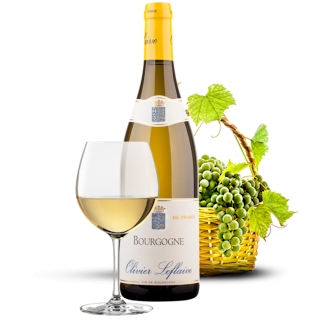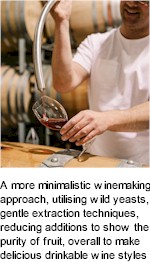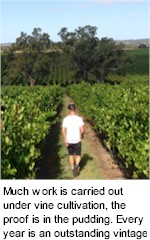


Murdoch Hill acknowledges the people of Peramangk Land on which it stands and recognises their connection to culture, country and community. Murdoch Hills vineyard and winery are located behind the beautiful Adelaide Hills township of Oakbank. Family farmed since 1939, with four generations caring for their land. The great adventure into winemaking began 1998. The winemaking team had already cut their teeth amongst the sacred vineyards of Barolo, the illustrious Shaw & Smith and Best’s Great Western. They returned to Murdoch Hill to make wines that are fully focused on being honest to their origins and to express local creativity. Combining sound technical knowledge with an adventurous spirit. Employing techniques which give freshness and vibrancy, achieving elegant wines that are best suited to pairing alongside the modern Australian food scene.

Murdoch Hill make wines which show a sense of place, something quite similar to that which is well embedded within the European wine culture. This requires moving in a more minimalistic winemaking approach, utilising wild yeasts, gentle extraction techniques, reducing additions to show the purity of fruit, overall to make delicious drinkable wine styles. Murdoch Hill burst onto the scene with an adventurous series of small batch Artisan wines, working with fruit from exceptional parcels across the Adelaide Hills. While the Artisan series continue to showcase an exceptional quality of fruit and highly progressive techniques, the estate team have never lost sight of an exciting journey as they transition from making wine to growing grapes. Ultimately it will come to define the excellence of all things Murdoch Hill.
The estate Oakbank property was planted in 1998. The first priority was to address health of the soil and to bring the handling of fruit to estate premises. With a mere twenty hectares under vine, and 300 head of cattle to manage, the process has taken time.
The improvements have never ceased at Murdoch Hill but they are not trying to reinvent the wheel. There is a steady program of incremental adjustments to better coax the inherent natural beauty and purity of estate grown fruit from the soil to the glass.

Underpinning the dramatic rise in quality of the home block wines is the policy to cease the use of synthetic inputs for control of weeds, pests and disease. Much work is carried out under vine cultivation, organic sprays and cover crops to regenerate the soil. The proof is in the pudding. Every year is an outstanding vintage. Murdoch Hill are characterised by their beautiful depth of fruit allied, incredible fragrance and chaste purity. Such delicious merits shine loud and clear in the chiselled Chardonnays and lacy, fragrant Pinot Noir. It’s really just about taking the best possible fruit from Murdoch Hill vineyard, capturing it and putting it in the bottle. Not taking too much out of the wine or putting anything into it.